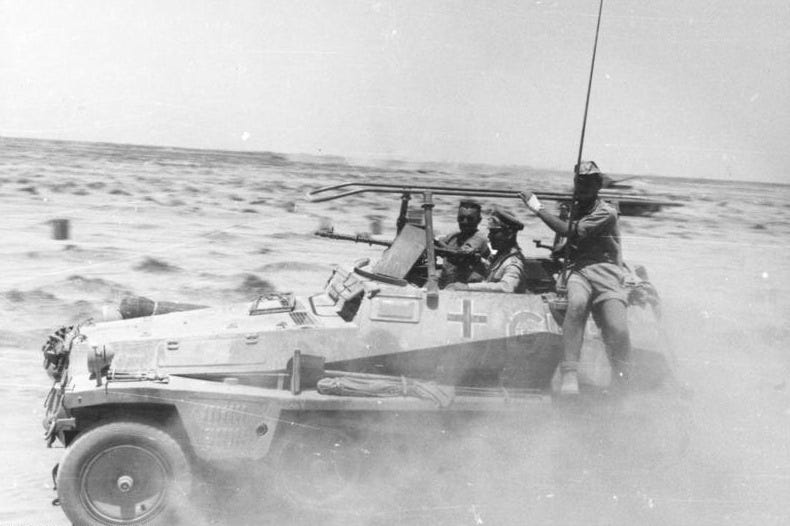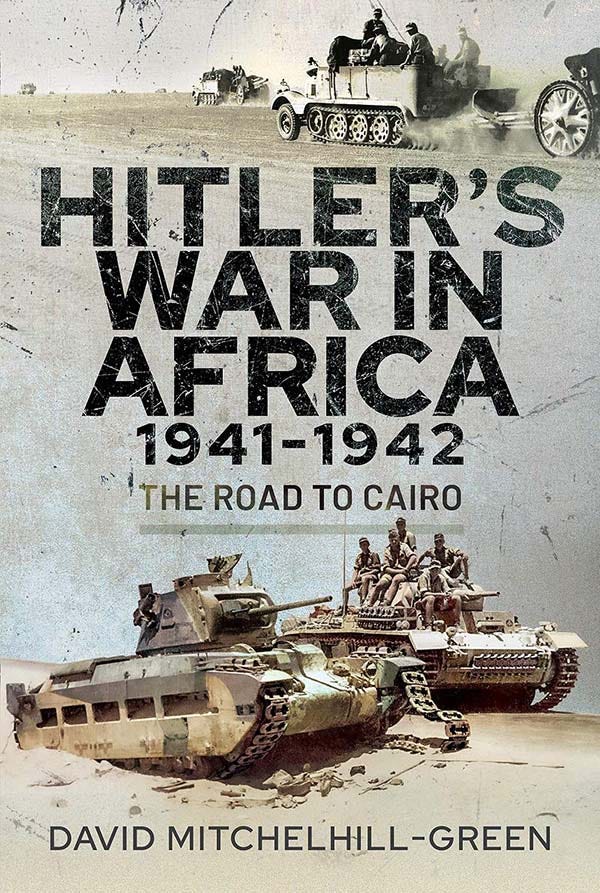Hitler's War In Africa 1941-42
This week's book excerpt looks at the situation in North Africa as both sides prepare for a new offensive
Although the title suggest this newly published study might be more about the German perspective, Hitler's War In Africa 1941-42 provides a balanced view of the Desert war. The author has used a very wide variety of sources to concentrate on personal perspectives of the see-saw battles that saw both armies advance and retreat more than once over the period. This would be a good companion to Britain's Desert War in Egypt & Libya 1940-1942 which I featured a few weeks ago.
The following excerpt looks at the end of August 1942 as both sides prepared for their next offensive:
Churchill again visited Egypt on 19 August (on the return leg of a meeting with Stalin) where Monty was hounded to open a Second Front. Moran overheard Churchill in high spirits singing in his bath (on the day of the bloody fiasco at the German-occupied port of Dieppe) when Alexander arrived to drive him to the front.
A tour of the high ground, where the next battle would be fought, followed. To Churchill’s amazement, the troops were ‘naked, except for a loin-cloth... burnt brown by months under the Africa sun.’
Turning to his physician, he exclaimed, ‘Forty-four years ago it was a military offence to appear without a path helmet... Why don’t these fellows here get sunstroke and heatstroke?’ ‘How fashions change’, his memoirs later told.
Preparations for the prime minister’s visit to Montgomery’s HQ at Burg el-Arab revealed a dilemma: no brandy was on hand.
As de Guingand describes, ‘An ADC was sent to Alexandria to buy some. A local product was found, and to drink this one had to have a cast-iron stomach, and a very good head.’ An element of subterfuge was employed with the local liquor decanted into the bottle of a well-known French brand.
Brooke was impressed by Montgomery’s energy and grasp of the situation. But Monty was not to be rushed. He explained to his party the need for six weeks’ thorough preparation, reforming divisions into three army corps, ‘breaking-in’ the new American Sherman tanks and using artillery ‘as had never been possible before in the desert.’
His chosen date for an offensive was at the end of September. This ‘disappointed’Churchill, who later wrote: ‘Although I was always impatient for offensive action on our part at the earliest moment, I welcomed the prospect of Romme breaking his teeth upon us before our main attack was launched.'
‘To gain an edge over the enemy, Montgomery showed special interest in the drug Benzedrine sulphate’
To gain an edge over the enemy, Montgomery showed special interest in the drug Benzedrine sulphate — likely because of its reputation as a ‘confidence drug’ or ‘pep drug’ and its potential as a ‘pharmacological morale boost’.
Psychologists were already aware of the drugs effects on the nervous system, as well as its shortcomings, a variety, of psychologic reactions which are unpredictable and at times paradoxic. Nevertheless Brigadier Quentin Wallace (X Corps) believed that pep pills, properly administered, would be a powerful weapon against the enemy.’ Field tests using methamphetamine and amphetamine over 48 hours were conducted on 7 September to determine any improvement in marching speed and arithmetic scores.
Another bevy of tests at the end of September put two infantry squads through a series of tasks such as shooting, trench digging, signalling and machine gun reassembly with no sleep and only short rest periods. This was followed by a seven-mile march in which the ‘Benzedrine squad’ beat its placebo counterpart by 11 minutes, marching with ‘snap and zest’." The results supported a pharmacologically-enhanced fight with 100,000 5 mg tablets ordered for distribution to combat units in the forthcoming battle.
Interestingly, the corresponding use of methamphetamine in the Wehrmacht at this time was declining, with drugs such as Pervitin restricted to ‘emergency’ use and listed as ‘dangerously addictive’.
In contrast to his sprightly opponent, Rommel was now exhausted. Barely able to review and sign the reports placed before him, the ‘Desert Fox’ would fall into bed early. Siegfried Westphal wrote of the burden he carried:
He was not only the soul but also the motive power of the North African war. Frugal and abstemious as he was, he would never have incurred the cardiac weakness which afflicted him in 1942 if it had not been for the continual over-activity to which he forces himself. His responsibility for the war theatre and for his troops lay heavy on him.
Rommel’s personal physician Professor Hans Horsters (Wiirzberg University) diagnosed the ‘symptoms of low blood pressure, with a tendency to fainting fits. His present condition is due to stomach and intestinal complaints he has had for a long time, aggravated by the unfavourable climate.’
Writing home, Rommel explained his need to convalesce in Germany. He closed with the comment that having used up five generals per division for eighteen months, his time for an ‘overhaul’ had come.
This excerpt from Hitler's War In Africa 1941-42 appears by kind permission of Pen & Sword Books Ltd. Copyright remains with the author.



